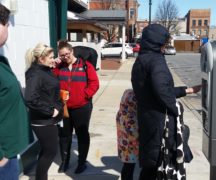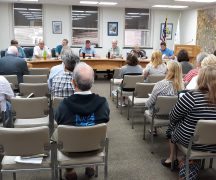By JAN LARSON McLAUGHLIN
BG Independent News
As she fumbled with the parking kiosk machine, Jennifer Bechtold reminisced about the good old days when she used to live in Bowling Green. “I liked when I could use good old-fashioned change,” in the parking meters.
But last week, she stood out in chilly weather with her 4-year-old daughter, who wasn’t feeling well, trying to figure out the parking kiosk the downtown lot.
“It’s very cold,” she said.
Waiting behind her was Rena Blazek, a graduate student at Bowling Green State University.
“I hate standing out in the winter. It sucks – and I’m from Wisconsin,” Blazek said.
When Blazek finally made it up to pay at the kiosk, the machine repeatedly spit out her coins before accepting one.
Next in line was Jacob Weinmann, of Grand Rapids.
“I had to wait a good 10 minutes,” to pay at the kiosk, Weinmann said. Yet, he was the most patient of those in the line, since he believes the kiosks make sense so the parking meters don’t have to be removed for the Black Swamp Arts Festival each year.
Next was Kim Jacobs, of Napoleon, who didn’t realize she needed to know her license plate number in order to pay for parking.
“Nope, that was a surprise,” Jacobs said, adding that she was lucky enough to be able to read her plate from the kiosk.
Assistant Municipal Administrator Joe Fawcett said he is aware that the new parking kiosks are not getting rave reviews from some motorists.
“We certainly are trying to monitor the situation,” Fawcett said.
The city’s parking technicians have reported that the use of the kiosk parking lot is consistent with the use when the lot had individual parking meters. The kiosks allow motorists to pay with coins, dollar bills or credit cards.
According to the city, the benefits of changing over to kiosks include:
- Replacement parts are more difficult to find and are becoming more expensive for the outdated parking meters.
- Increased efficiency to clear the parking lot following snow storms.
- Reduced maintenance for special events such as the Black Swamp Arts Festival.
- Reduced maintenance costs associated with parking blocks, meter poles and meters.
- Keep newly repaved parking lot intact.
The kiosk also allows motorists who pay with credit cards to extend their time without revisiting the parking lot.
However, since the meters were taken out last September and replaced with the kiosks, the lot has become a tough sell for some motorists who avoid parking there.
“People just don’t like them,” Fawcett said.
One of those frustrated shoppers was Cheryl Sharp, of Pemberville, who said her experience with the kiosk resulted in her forgoing visits to several shops in the downtown. She had to walk back to her car to get her license plate number, then the kiosk took several minutes to use. And though the parking limit is two hours at 25 cents each, the machine gave her no change when she fed it a dollar bill. Sharp saw the option of using a credit card, but said she would rather not use her credit card for a 50 cent charge.
After meeting friends for lunch, Sharp said she didn’t want to risk getting a parking ticket for overstaying her time, so she skipped her shopping plans.
Some downtown business owners have passed on complaints from shoppers to city officials. Members of the city administration recently met with about 15 downtown business owners about the parking kiosk concerns.
“We are receptive to ideas,” Fawcett said.
The city has already added more signage and more payment kiosks in an effort to better accommodate people parking downtown. The next change may be the placement of a roof over the kiosk behind SamB’s restaurant to keep motorists out of the weather as they pay for parking.
Bowling Green has plans to switch over to kiosks in the other city parking lots downtown. But Fawcett said last week that city officials want to wait to see if the public’s comfort level with the kiosks improves before any more parking lots get kiosks.
“We’re going to continue giving this more time,” Fawcett said.





